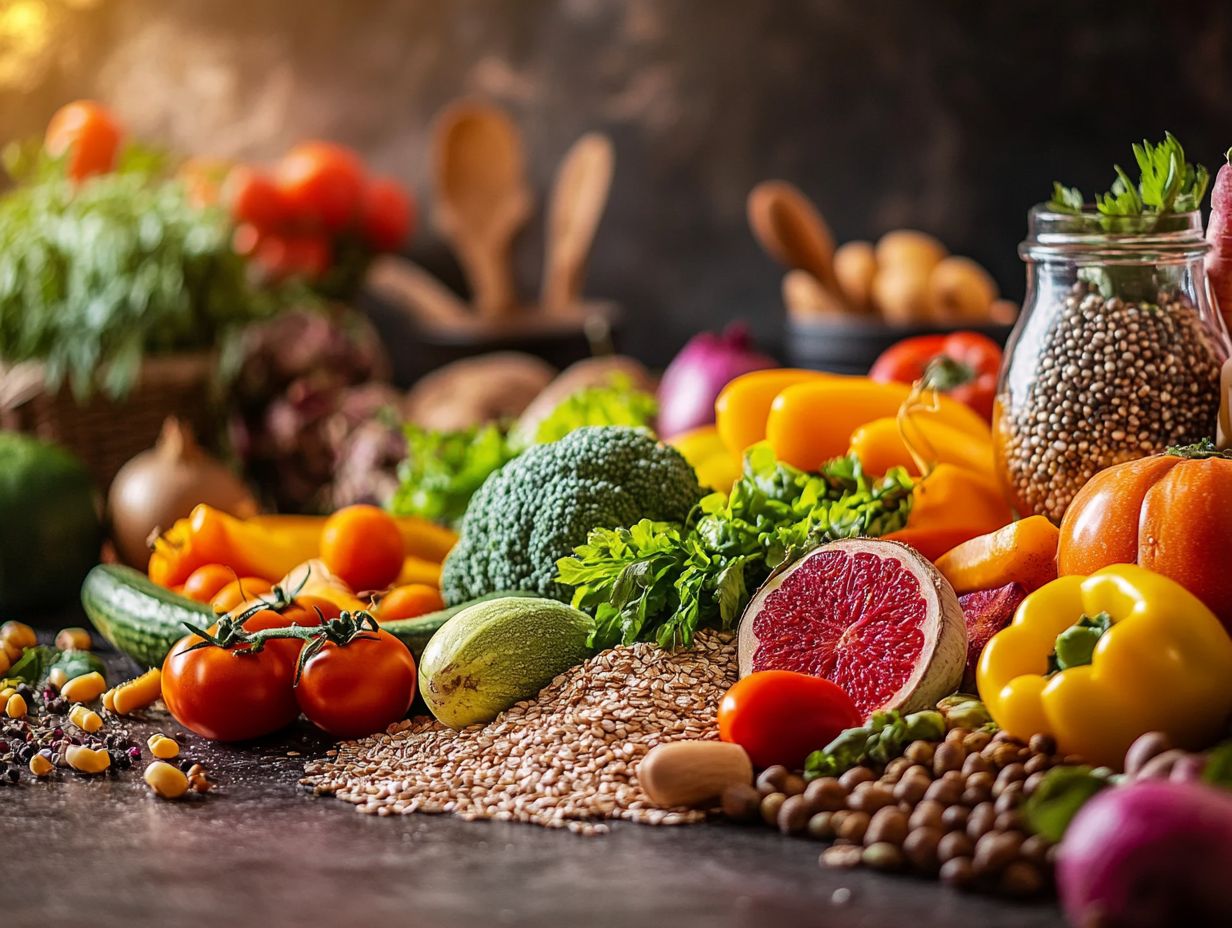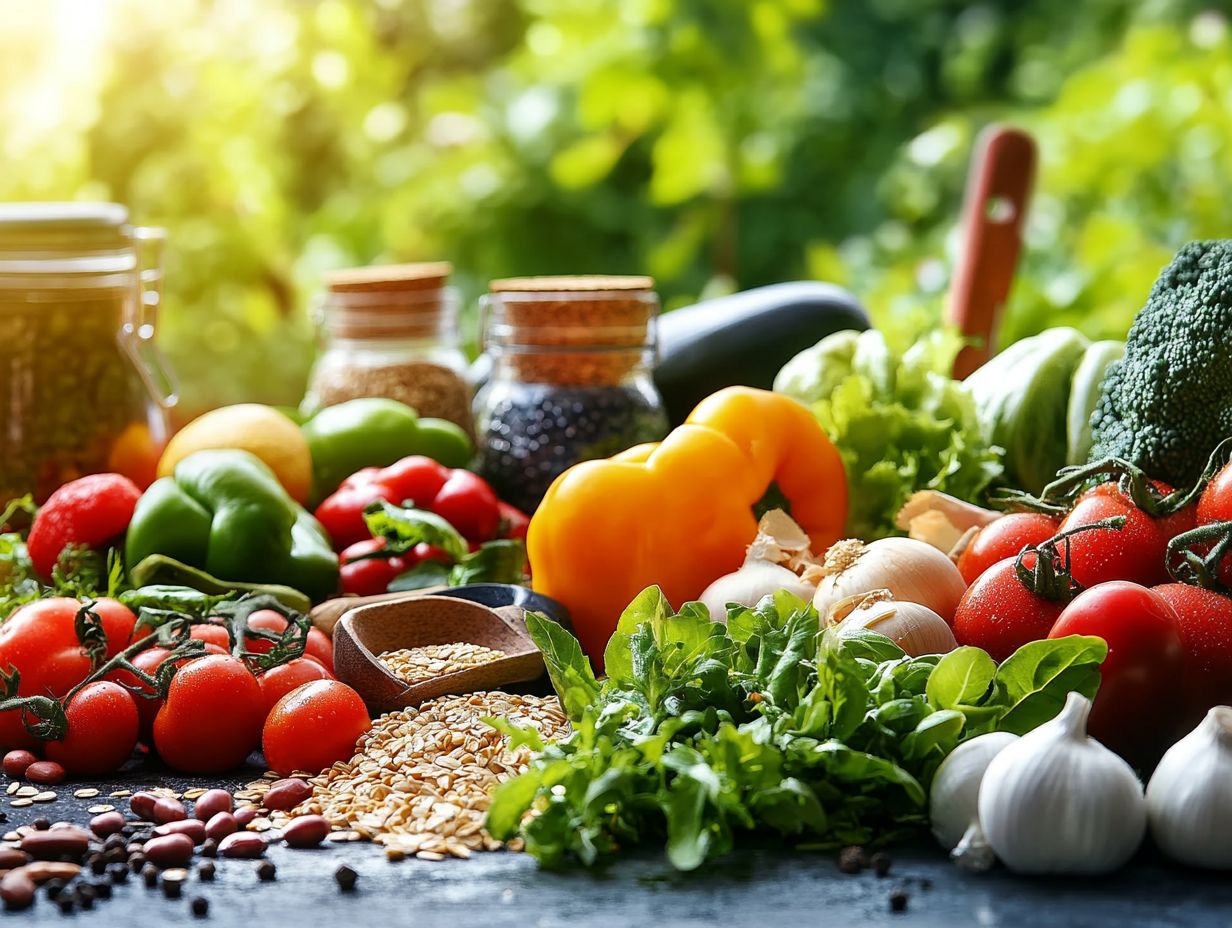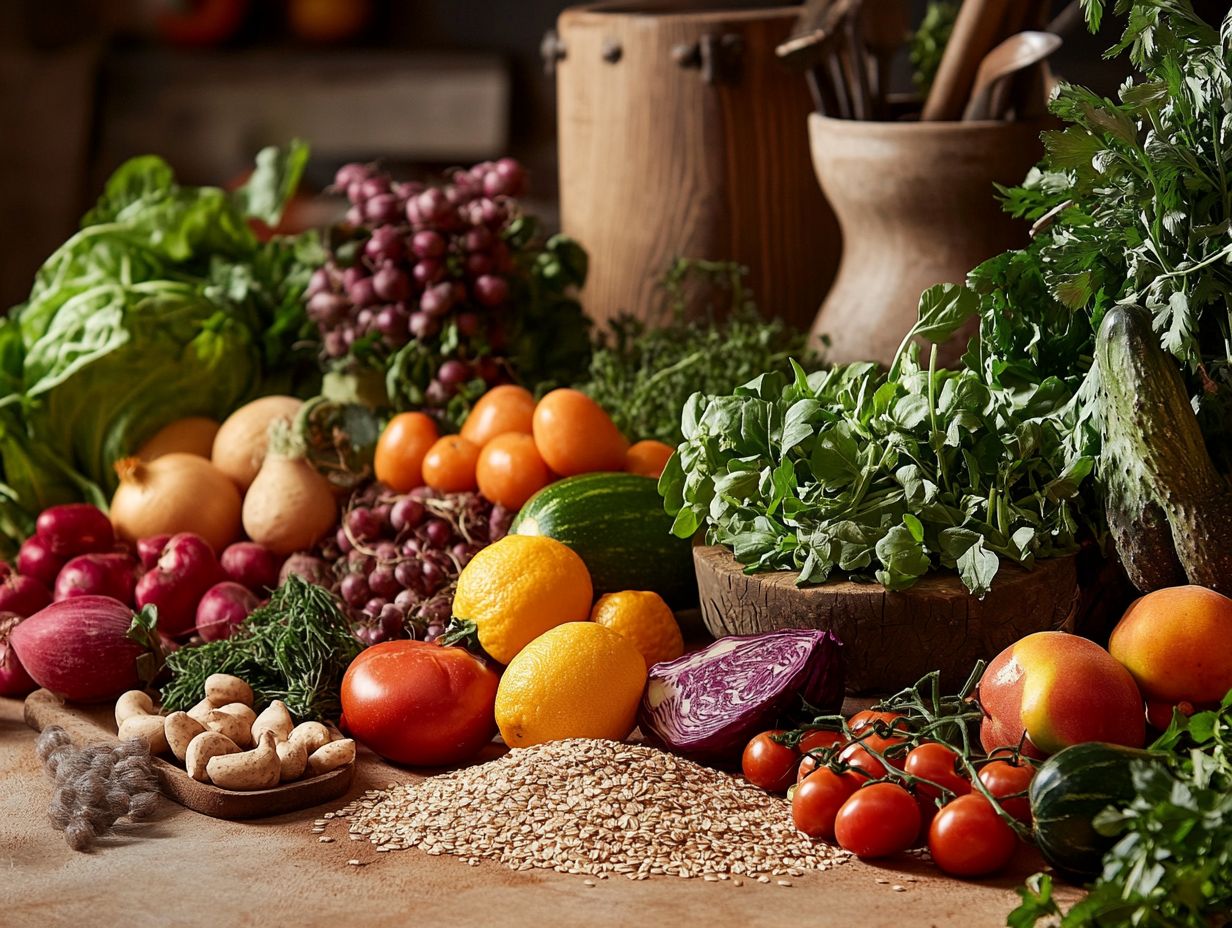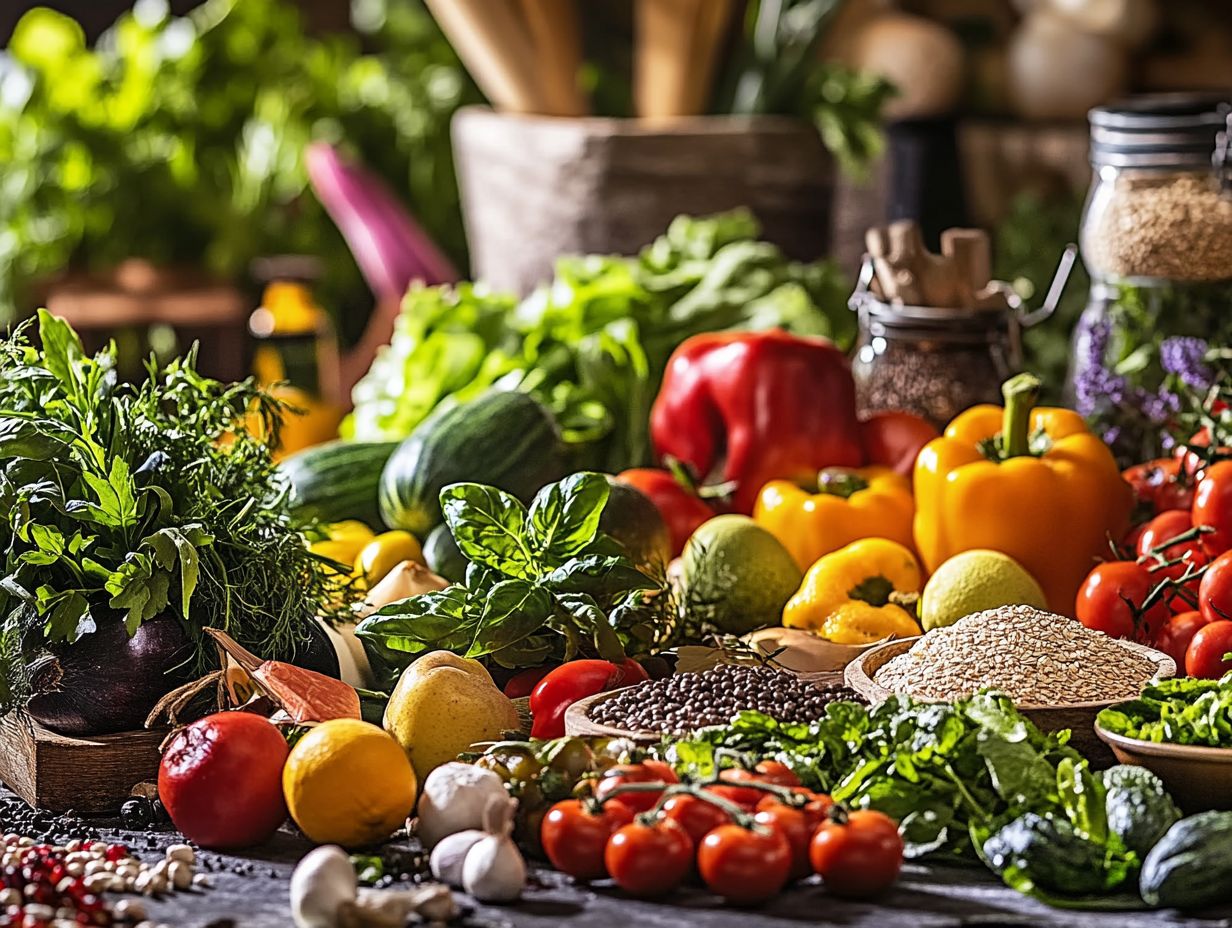How to Create a Sustainable Diet?
In today s world, your food choices have a big impact on your health and the environment.
By embracing a sustainable diet, you enhance your well-being and help the planet.
This article explores sustainable eating, detailing the health and environmental benefits while breaking down essential components to include in your diet.
You ll discover practical tips for integrating local foods and minimizing waste, plus insights into common challenges.
Join us on this journey toward a more sustainable lifestyle through mindful eating.
Contents
Key Takeaways:

A sustainable diet supports personal health and the planet’s health.
Incorporating local and seasonal foods and cutting down on waste are key to sustainability.
Overcoming budget and accessibility barriers is essential for a long-term sustainable diet.
What is a Sustainable Diet?
A sustainable diet focuses on nutrition that respects the environment while also improving your health.
It aims to reduce the environmental impact of food choices and promote ecological balance.
Seasonal produce, mindful consumption, and plant-based options are vital components of this diet.
By making informed choices, you help lower greenhouse gas emissions and protect biodiversity, ensuring food security for future generations.
Defining Sustainability in Nutrition
Sustainability in nutrition means choosing foods that support your health and the environment.
This approach encourages eco-conscious eating by opting for local and seasonal products, which helps reduce your carbon footprint.
Mindfully reducing food waste is equally important. Get creative with leftovers to prevent excess food from reaching landfills.
Exploring diverse diets supports communities and promotes biodiversity.
When you adopt these practices, you contribute to a food system that values everyone s well-being.
Why Choose a Sustainable Diet?
A sustainable diet brings numerous benefits to you and the planet.
This choice boosts food security while lowering the carbon footprint of traditional eating habits.
Health and Environmental Benefits
The health benefits of a sustainable diet are impressive. You can improve your nutrition and lower your risk of chronic diseases.
Switching to sustainable eating also significantly reduces greenhouse gas emissions and fosters biodiversity.
Including more plant-based foods in your meals enhances heart health, lowers cholesterol, and boosts energy.
Think about adding legumes, grains, and seasonal vegetables; they are nutritious and lower in calories.
Reducing food waste is crucial for protecting the environment. Shockingly, one-third of global food goes to waste, which adds to methane emissions.
By practicing mindful consumption and composting, you can greatly decrease your carbon footprint and nurture a sustainable ecosystem.
Start your journey to a sustainable diet today and make a lasting impact!
Components of a Sustainable Diet

The elements of a sustainable diet include a diverse array of food sources that are not only nutritious but also environmentally responsible.
You should consider incorporating plant-based options, whole grains, locally sourced foods, and seasonal produce into your meals. This approach supports ethical eating and champions regenerative farming practices, allowing you to nourish both your body and the planet.
Key Nutrients and Food Sources
Key nutrients in your sustainable diet should include plant proteins, whole grains, fruits, and vegetables. Together, they provide a balanced nutritional balance for good health.
These elements enhance your well-being and play a vital role in promoting environmental sustainability. For example, plant proteins from legumes, nuts, and seeds deliver high-quality amino acids while significantly reducing the carbon footprint linked to animal agriculture.
Whole grains like quinoa, brown rice, and oats are brimming with fiber and essential nutrients. They support your digestive health and lower the risk of chronic diseases.
By incorporating a diverse array of fruits and vegetables, you ensure a generous intake of vitamins, minerals, and antioxidants that defend against illness and boost overall vitality. This transforms every meal into an experience that is both nourishing and sustainable.
Tips for Creating a Sustainable Diet
Ready to make a change? Here are some essential tips to help you craft a sustainable diet that benefits you and the planet! You can learn how to create a sustainable eating plan by embracing straightforward yet impactful strategies.
Start by incorporating local foods and choosing seasonal produce. Both not only enhance your meals but also support the environment.
Implement methods to reduce food waste to solidify your commitment to eco-friendly eating habits, making a significant difference with every bite.
Incorporating Local and Seasonal Foods
Incorporating local and seasonal foods into your diet supports community farmers and elevates the nutritional quality and flavor of your meals while minimizing the environmental impact of food transport.
When you opt for products grown in your region, you cultivate a deeper connection with local producers. This fosters a sense of community and shared purpose.
This relationship encourages sustainable farming practices that emphasize eco-friendly methods, ensuring the land remains fertile for generations to come.
By embracing seasonal foods, you get to enjoy produce at its peak freshness, brimming with essential vitamins and minerals benefits often diminished in foods that have traveled long distances.
Ultimately, this holistic approach to eating enriches your personal health while bolstering the resilience of local food systems. It promotes economic viability for farmers and enhances the overall sustainability of your region.
Reducing Food Waste
Reducing food waste is essential for embracing a sustainable diet. Strategies like composting and opting for package-free options play a critical role in environmental conservation.
When you effectively implement these strategies, you cut down on the food that lands in landfills. You also contribute to healthier soil and thriving ecosystems.
Composting, in particular, gives you the power to recycle organic matter, transforming kitchen scraps into nutrient-rich soil that can elevate your gardening efforts.
By choosing package-free options, you also sidestep unnecessary packaging waste. This supports a circular economy that champions the use of reusable containers.
Make mindful choices and adopt these practices to significantly reduce your environmental footprint and cultivate a culture of sustainability within your community.
Challenges and Solutions for Maintaining a Sustainable Diet

While the advantages of a sustainable diet are undeniably appealing, you might face challenges like budget constraints that can hinder your journey toward a sustainable diet. Act now to overcome these hurdles!
This is particularly relevant when considering the issues of overfishing and the environmental footprint of the livestock industry.
Budget and Accessibility
Budget and accessibility are significant barriers you face when trying to maintain a sustainable diet. High costs for local foods often keep you from making eco-friendly choices act now!
It’s all too easy to find yourself in a cycle where lower-priced, processed foods dominate your shopping list. This results in less-than-ideal nutritional outcomes. Community initiatives aimed at promoting affordable access to fresh produce are urgently needed to pave the way for more sustainable dietary practices.
Local food systems, such as farmers’ markets and group buying programs, offer affordable options while enhancing economic resilience. By connecting you directly with producers, these initiatives help you make healthier choices, effectively addressing the critical intersection of food equity and sustainability.
Overcoming Barriers to Sustainability
Overcoming barriers to sustainability often hinges on your community’s support and education, empowering you to make informed choices about your diet and lifestyle. By creating an environment where knowledge flows freely, your community can inspire you to embrace sustainable practices.
Local workshops, cooking classes, and community gardens offer hands-on experience and foster a sense of belonging. Educational programs that emphasize the environmental impact of food choices ignite your curiosity and motivate collective action.
These collaborative efforts also raise awareness about sustainable dietary changes. They encourage you to adopt practices that benefit both your health and the planet. When you begin to see the tangible benefits of these initiatives, you’re more likely to maintain your commitment to a greener lifestyle.
Frequently Asked Questions
What is a sustainable diet?
A sustainable diet is healthy and promotes environmental, social, and economic sustainability by incorporating foods that are nutritious, locally sourced, and ethically produced.
Why is it important to create a sustainable diet?

Creating a sustainable diet is crucial for personal and global well-being. It can improve your health, support local communities, and reduce your carbon footprint.
How do I start creating a sustainable diet?
Start by incorporating more plant-based foods into your diet, such as fruits, vegetables, whole grains, and legumes. Choose sustainably sourced animal products and limit your consumption of processed foods.
Can I still eat meat and be on a sustainable diet?
Yes, you can still eat meat on a sustainable diet. However, it is recommended to choose sustainably sourced, organic, or grass-fed animal products in moderation.
Is a sustainable diet more expensive?
It can be, but it doesn’t have to be. By choosing locally grown and in-season produce, buying in bulk, and avoiding processed foods, you can save money while still following a sustainable diet.
How can I stay committed to a sustainable diet?
It can be challenging to stick to a sustainable diet, but you can take several steps to stay committed. Set realistic goals, educate yourself on the benefits of a sustainable diet, connect with like-minded individuals, and be open to trying new foods and recipes.



